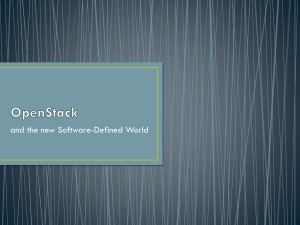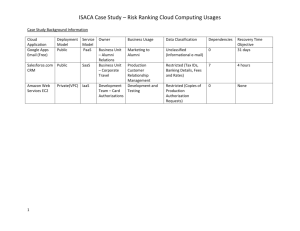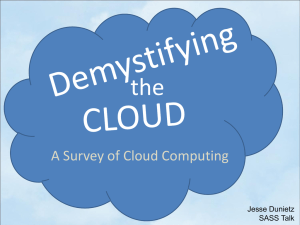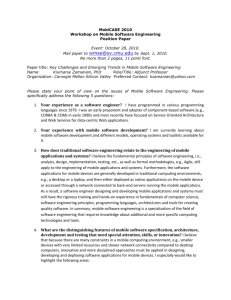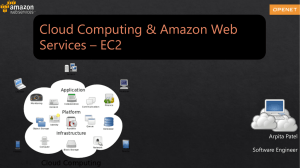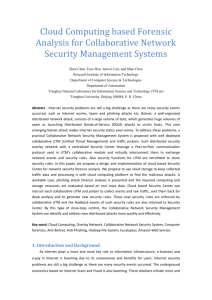Amazon Cloud Performance Compared
advertisement
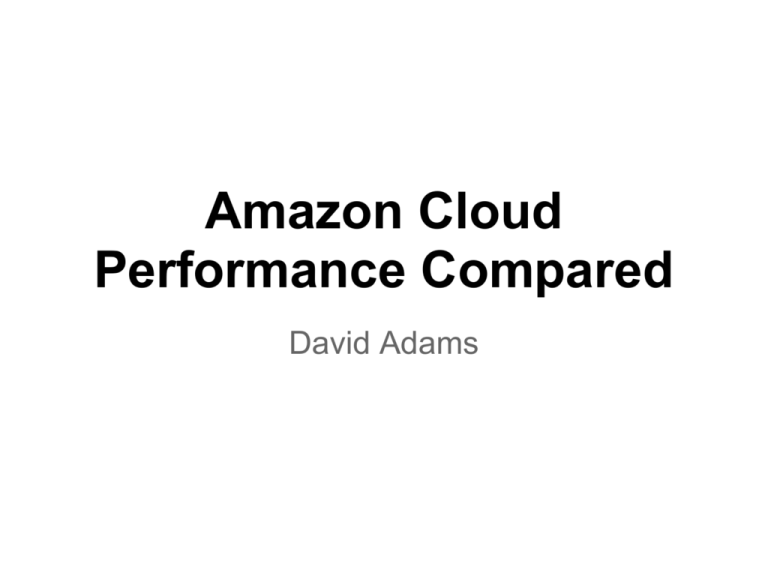
Amazon Cloud Performance Compared David Adams Amazon EC2 performance comparison How does EC2 compare to traditional supercomputer for scientific applications? "Performance Analysis of High Performance Computing Applications on the Amazon Web Services Cloud", 2010 HPC Benchmarking NERSC - benchmark framework MPI Head node, worker nodes File server implemented with EBS IPM - MPI communication monitor Compared: Amazon EC2 - N node, m1.large instance 4xEC2 compute units 1-1.2 ghz opteron or xeon per unit Carver - 400 node, 2 x intel quad 2.67 nehalem / node Franklin - 9660 node cray xt4, quad 2.3 opteron / node Lawrencium - 198 node 2x intel xeon quad 2.66 / node NERSC Benchmark Suite CAM ● Community Atmosphere Model ● Stresses processor data movement and MPI interconnect p2p bandwidth Gamess ● General Atomic and molecular electronic structure system ● memory access and bandwidth, collective interconnect performance GTC ● Stresses indirect addressing and random access memory IMPACT-T ● Integrated Map and Particle Accelerator Tracking Time ● sensitive to memory bandwidth and MPI performance NERSC Benchmark Suite Cont MAESTRO ● Stresses memory performance, latency and global communications MILC ● Stresses memory bandwidth, prefetching and processing power Paratec ● Parallel Total Energy Code ● Stresses global communication bandwidth, processing power HPCC ● 7 synthetic benchmarks ● Targets computation, communications Performance: Application Runtime Metrics take into account cluster size Performance Analysis of High Performance Computing Applications on the Amazon Web Services Cloud Performance: Percentage runtime communicating using IPM Performance Analysis of High Performance Computing Applications on the Amazon Web Services Cloud Performance: Sustained Flops Performance Analysis of High Performance Computing Applications on the Amazon Web Services Cloud Considerations using EC2 Heterogeneous cpus: ● Intel Xeon E5430 2.66GHz quad-core processor ● AMD Opteron 270 2.0GHz dual-core processor ● AMD Opteron 2218 HE 2.6GHz dual-core processor ● Cannot optimize code High performance variability ● Sharing hardware with other vms Slow node communication ● Gigabit ethernet "Transient errors" ● Failure to boot, network misconfigurations, virtual machine hangs Not always able to acquire requested cores ● 256+ cores require scheduling/reservation Cost/Performance compared to Desktop Grid How does Amazon EC2 compare to Grid Computing? "Cost-Benefit Analysis of Cloud Computing versus Desktop Grids", 2009 Desktop Grid/Volunteer Computing Fastest virtual supercomputers (From wikipedia) Bitcoin network 168.26 PFLOPS BOINC 5.634 PFLOPS Folding@Home 5 PFLOPS MilkyWay@Home 1.6 PFLOPS SETI@Home 730 TFLOPS Einstein@Home 210 TFLOPS Amazon HPC 240 teraflops 17024 cores Considerations using VC Slow acquisition of computing resources ● 7.8 days to achieve 1000 cloud node equivalent Slow task deployment ● time = (reconnections * # tasks) / # clients ● 1000 tasks to 10000 nodes about 45 min Slow completion times ● deadlines, priorities, 96+% completion rate ● Average 9 days vs < 4 hours on dedicated When would you use VC over Cloud? Cost-Benefit Analysis of Cloud Computing versus Desktop Grids Cloud Power attainable given VC Costs Resources Per Month Given 12k/Month Processing Storage SETI 514 TeraFLOPS 7.7 TB Amazon 2 TeraFLOPS* 80 TB* *One or the other Cloud-VC Hybrid Approach Cost-Benefit Analysis of Cloud Computing versus Desktop Grids Host VC Server on Cloud: Cost Breakdown Storage vs Bandwidth Storage vs Bandwidth for a fixed budget Cost-Benefit Analysis of Cloud Computing versus Desktop Grids Conclusions VC outperform clouds on cost for large long term and highly parallel projects ● Projects on the order of weeks ● VC needs a certain number of volunteer nodes before cost effectiveness ● High startup costs make short term projects not cost effective 1 small EC2 instance is equivalent to 2.83 VC hosts Hybrid approach can lower startup and monthly costs of VC ● 40% savings on SETI
